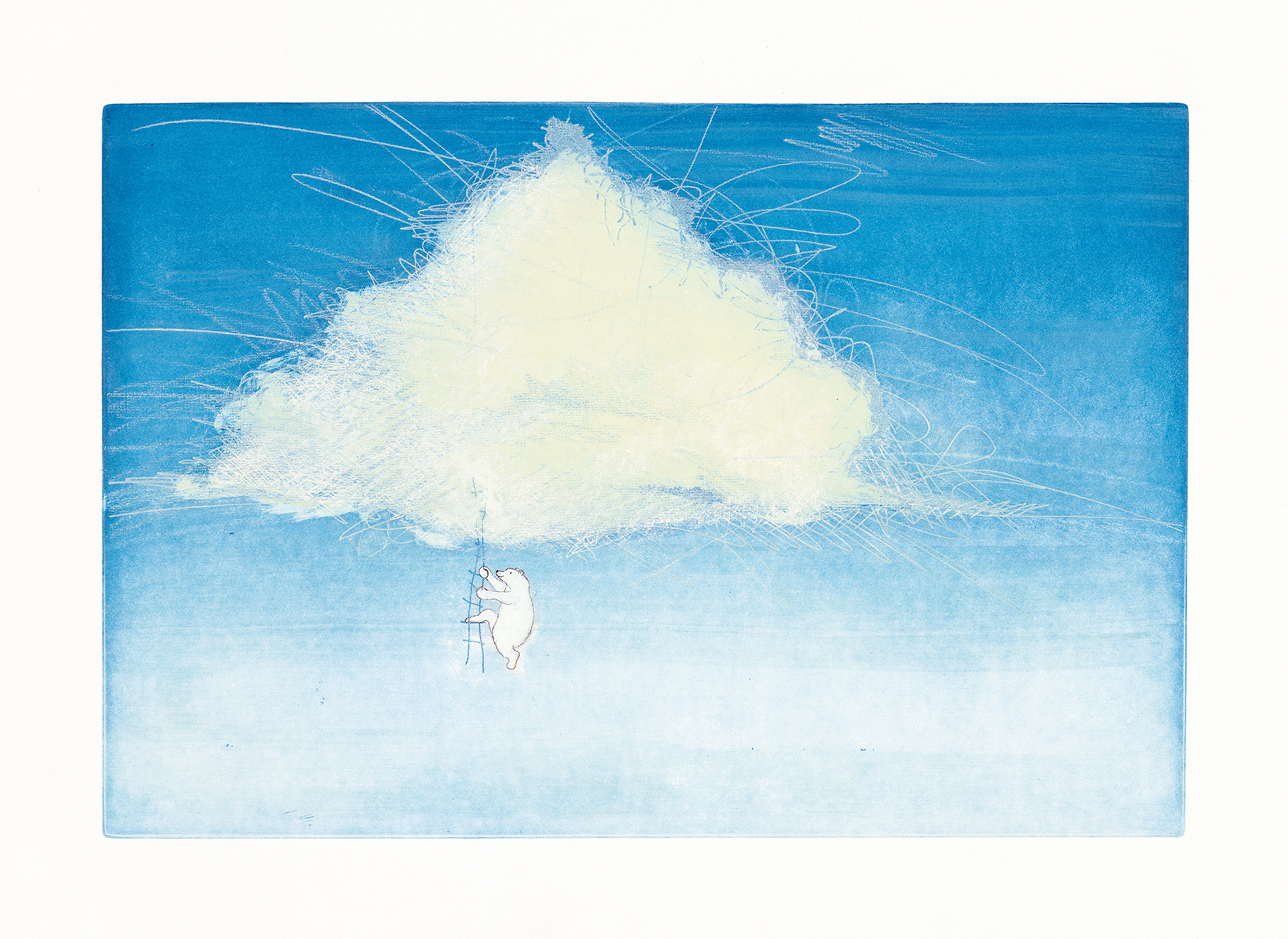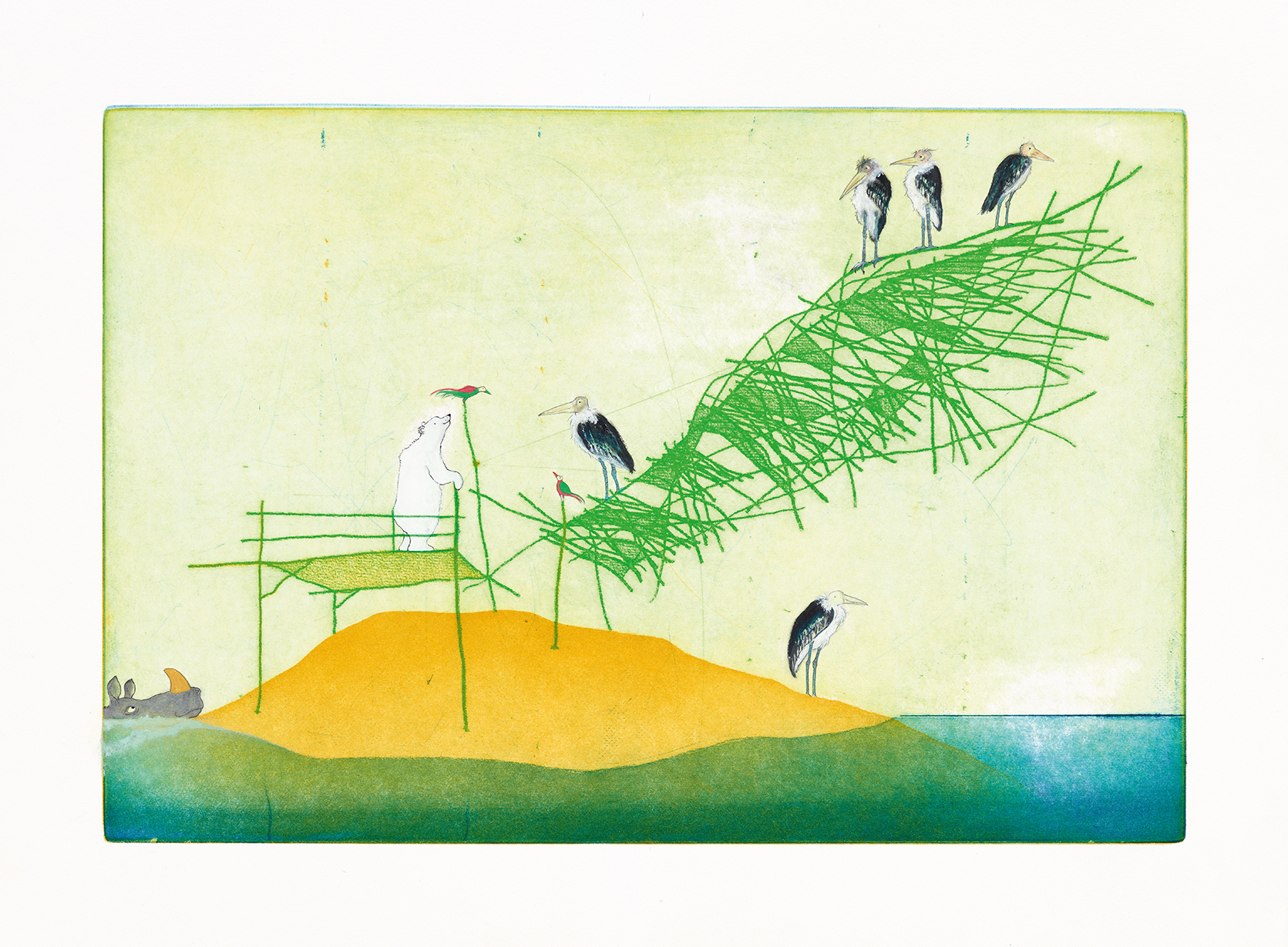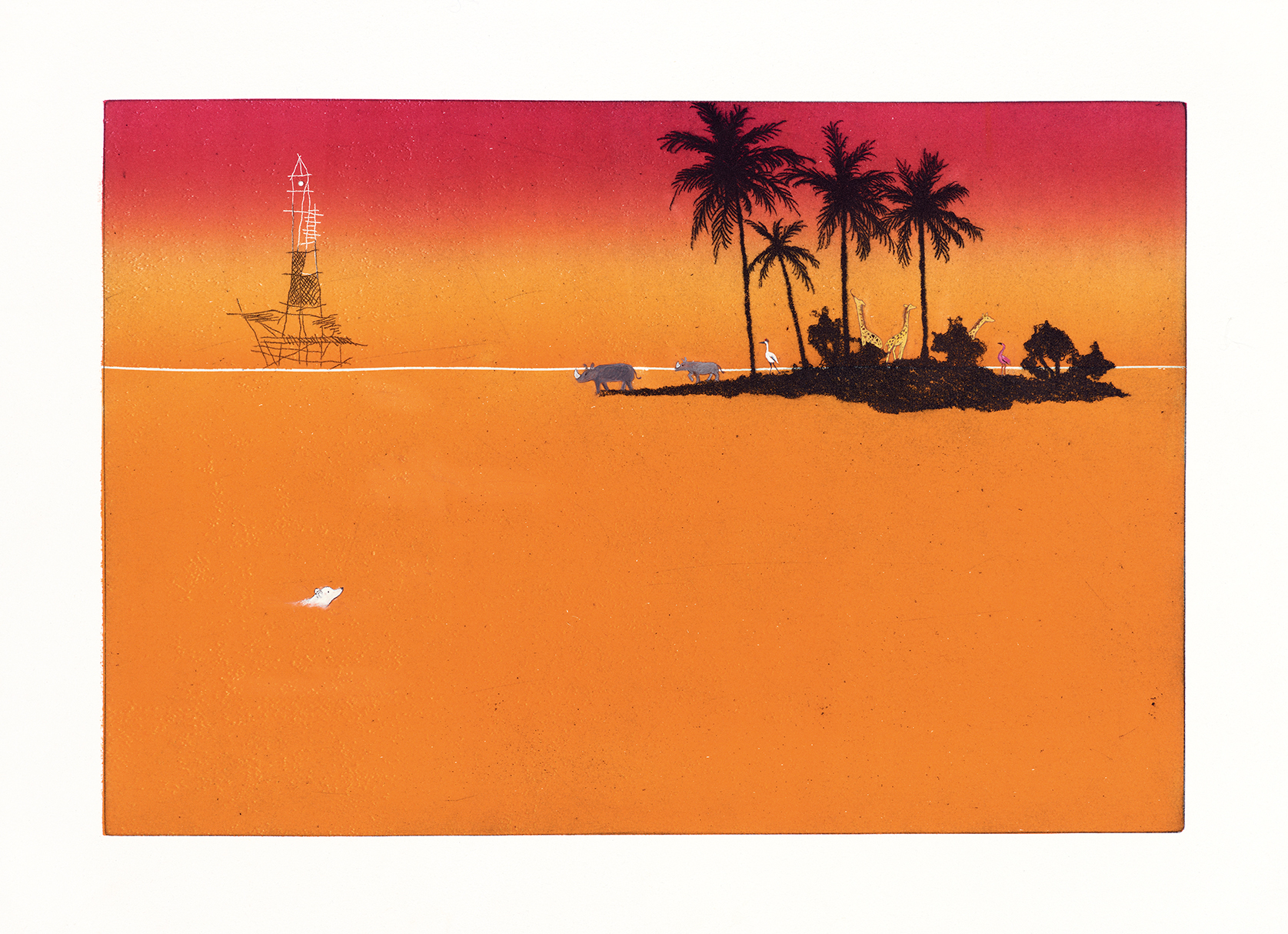het eiland
The Bologna Ragazzi Award-winning father & daughter team, Marije and Ronald Tolman, conquered the world with their fairy-tale like pictures of The Tree House. Now, this golden team again creates a world without words with a polar bear’s dreamy journey along awe-inspiring islands and colorful animal friends.








— Ronald Tolman ︎︎︎
From Island to Island
Ronald Tolman
Off the coast of the Netherlands, there once lived two boys, each on his own island, Vlieland and Terschelling. The boy on the island of Terschelling became a soldier and was called Hillarius. He was my father and Marije’s grandfather. Jan Jacob lived in the village on Vlieland; he became a sailor and poet.
Vlieland is the island where, one hundred years ago, Jan Jacob walked on the beach by the sea and peered at the ships on the horizon. In him burned the desire to become a great poet. The austere lighthouse on nearby Terschelling made him feel rebellious and restless. It seemed like the tower was keeping an eye on everyone on his island. Apparently, the tower had been doing that for four hundred years, day and night.
Around the time that Jan Jacob was roaming around his island, on the other island, in a small house at the foot of the Brandaris, for that was the name of the lighthouse on Terschelling, the boy was born who was called Hillarius after a sailor who had never returned from his voyage.
Sailing ships and steamboats used the channel between the islands to call in at the port of Amsterdam. To this day, it is still busy with trawlers and large vessels coming and going. The sea is so turbulent and dangerous there that the islanders do not dare make the crossing and are strangers to one another. Never did Jan Jacob see Brandaris up close; nor did Hillarius ever wander on the beach of Vlieland.
In stormy weather, Jan Jacob put poems in empty bottles and threw them into the sea. Once he received a letter from a girl; she wrote that she would keep the green bottle and the poem forever. Hillarius never found any of these bottles.
In his village, Hillarius grew up a happy little fellow who listened to the sea with a large shell to his ear. One day, he was finally allowed to go up the tower. Following the old lighthouse keeper up the stairs, he counted two hundred and twenty-five steps on the spiral staircase. At the top of the tower he saw a giant bulb, the lamp that was switched on by the lighthouse keeper when darkness fell. The nights of his childhood had never been without that light.
Through a shiny brass spyglass, little Hillarius looked with one eye at the ships on the horizon and slowly turned the instrument across the raging water to the island on the other side, the beach, a few ships in a harbour, a village and a small, bright red lighthouse. He kept turning the spyglass and for the first time in his life he saw the coast of the mainland, the scattered villages around the pointed church towers. With two hands, the old man turned a switch and the lighthouse lamp came on with a blinding light. Four searchlights swept across the island and the sea. Hillarius fell asleep under the rough horse blanket the lighthouse keeper had covered him with.
And what about Jan Jacob, the boy who always looked out over the sea? Jan Jacob Slauerhoff became a ship’s doctor and a famous Dutch poet. A man from the north of Europe who sailed every sea. From Portugal to China, Africa and Argentina. Some say he was happy; others claim the opposite. Nowhere did he feel at home. Some of his poems have been translated into Portuguese, sung beautifully as fado and tango by Cristina Branco, ‘Cristina Branco canta Slauerhoff, o descobridor’. One of his most famous poems is ‘Homeless’, which begins ‘Only in my poems can I make my home.’
Homeless
(Jan Jacob Slauerhoff, translated by A.Z. Foreman)
Only in my poems can I make my home.
I have found shelter in no other form.
There is no hearth I’ve pined for as my home.
A tent could be uprooted in the storm.
Only in my poems can I make my home.
While I still know that I can find those doors
In wilderness, in woods, on streets or moors,
I have no care, wherever I may roam.
Long though it be, the time shall surely come
When before eve my old powers lose their spark
And beg in vain for tender words of old
That I once built with, and the earth must fold
Me to my rest as I bow to the cold
Space where my grave bursts open in the dark.
And Hillarius? That morning, he descended the hundreds of stone steps to the bottom. At home, he put the giant old lighthouse lamp that he had been given by the keeper in the middle of the table in the cottage near the tower.
As a young man, Hillarius left for the mainland he had descried through the spyglass. The lamp came with him to all the houses in which he lived. Sometimes it hung from the ceiling or stood in a window where sunlight shone through. The lamp was always there, even though he could never explain why.
I received the lighthouse lamp from my father Hillarius and gave it a permanent place in all the studios where I worked. The lamp never stayed in a cupboard or crate for very long.
There are writers who cannot work without a rotting apple on their desk. Some only write with freshly sharpened pencils and the smell of cedar. Other writers are drunkards or chain smokers. Jan Jacob Slauerhoff wrote his most beautiful poems in ships’ bunks in the middle of the ocean. I can wholeheartedly recommend a lighthouse lamp.
The lamp now hangs in my daughter Marije’s workshop where, in the background, it adds lightness to her work.
Of course, our lighthouse lamp is not essential but it has been around for almost a hundred years. In Marije’s studio, near the big bulb from the lighthouse of Terschelling, her eight-year-old son draws pictures and writes accompanying poems. His name is Mees and ‘The Tree House’, the first book that his mother created with his grandfather, was dedicated to this Mees Cornelis Hilarius.
Het eiland
Ronald Tolman
Marije Tolman
Lemniscaat
2012
TranslationsSpanish, Adriana Hidalgo editora (Argentina)
German, Ars Edition
Chinese, Beijing 21st Century
Italian, Il Castello S.R.L.
English, Lemniscaat USA LLC (USA)
Japanese, Nishimura
Danish, Turbine Forlaget
Awards
Silent Books list of honour IBBY, Italy
Ronald Tolman
Off the coast of the Netherlands, there once lived two boys, each on his own island, Vlieland and Terschelling. The boy on the island of Terschelling became a soldier and was called Hillarius. He was my father and Marije’s grandfather. Jan Jacob lived in the village on Vlieland; he became a sailor and poet.
Vlieland is the island where, one hundred years ago, Jan Jacob walked on the beach by the sea and peered at the ships on the horizon. In him burned the desire to become a great poet. The austere lighthouse on nearby Terschelling made him feel rebellious and restless. It seemed like the tower was keeping an eye on everyone on his island. Apparently, the tower had been doing that for four hundred years, day and night.
Around the time that Jan Jacob was roaming around his island, on the other island, in a small house at the foot of the Brandaris, for that was the name of the lighthouse on Terschelling, the boy was born who was called Hillarius after a sailor who had never returned from his voyage.
Sailing ships and steamboats used the channel between the islands to call in at the port of Amsterdam. To this day, it is still busy with trawlers and large vessels coming and going. The sea is so turbulent and dangerous there that the islanders do not dare make the crossing and are strangers to one another. Never did Jan Jacob see Brandaris up close; nor did Hillarius ever wander on the beach of Vlieland.
In stormy weather, Jan Jacob put poems in empty bottles and threw them into the sea. Once he received a letter from a girl; she wrote that she would keep the green bottle and the poem forever. Hillarius never found any of these bottles.
In his village, Hillarius grew up a happy little fellow who listened to the sea with a large shell to his ear. One day, he was finally allowed to go up the tower. Following the old lighthouse keeper up the stairs, he counted two hundred and twenty-five steps on the spiral staircase. At the top of the tower he saw a giant bulb, the lamp that was switched on by the lighthouse keeper when darkness fell. The nights of his childhood had never been without that light.
Through a shiny brass spyglass, little Hillarius looked with one eye at the ships on the horizon and slowly turned the instrument across the raging water to the island on the other side, the beach, a few ships in a harbour, a village and a small, bright red lighthouse. He kept turning the spyglass and for the first time in his life he saw the coast of the mainland, the scattered villages around the pointed church towers. With two hands, the old man turned a switch and the lighthouse lamp came on with a blinding light. Four searchlights swept across the island and the sea. Hillarius fell asleep under the rough horse blanket the lighthouse keeper had covered him with.
And what about Jan Jacob, the boy who always looked out over the sea? Jan Jacob Slauerhoff became a ship’s doctor and a famous Dutch poet. A man from the north of Europe who sailed every sea. From Portugal to China, Africa and Argentina. Some say he was happy; others claim the opposite. Nowhere did he feel at home. Some of his poems have been translated into Portuguese, sung beautifully as fado and tango by Cristina Branco, ‘Cristina Branco canta Slauerhoff, o descobridor’. One of his most famous poems is ‘Homeless’, which begins ‘Only in my poems can I make my home.’
Homeless
(Jan Jacob Slauerhoff, translated by A.Z. Foreman)
Only in my poems can I make my home.
I have found shelter in no other form.
There is no hearth I’ve pined for as my home.
A tent could be uprooted in the storm.
Only in my poems can I make my home.
While I still know that I can find those doors
In wilderness, in woods, on streets or moors,
I have no care, wherever I may roam.
Long though it be, the time shall surely come
When before eve my old powers lose their spark
And beg in vain for tender words of old
That I once built with, and the earth must fold
Me to my rest as I bow to the cold
Space where my grave bursts open in the dark.
And Hillarius? That morning, he descended the hundreds of stone steps to the bottom. At home, he put the giant old lighthouse lamp that he had been given by the keeper in the middle of the table in the cottage near the tower.
As a young man, Hillarius left for the mainland he had descried through the spyglass. The lamp came with him to all the houses in which he lived. Sometimes it hung from the ceiling or stood in a window where sunlight shone through. The lamp was always there, even though he could never explain why.
I received the lighthouse lamp from my father Hillarius and gave it a permanent place in all the studios where I worked. The lamp never stayed in a cupboard or crate for very long.
There are writers who cannot work without a rotting apple on their desk. Some only write with freshly sharpened pencils and the smell of cedar. Other writers are drunkards or chain smokers. Jan Jacob Slauerhoff wrote his most beautiful poems in ships’ bunks in the middle of the ocean. I can wholeheartedly recommend a lighthouse lamp.
The lamp now hangs in my daughter Marije’s workshop where, in the background, it adds lightness to her work.
Of course, our lighthouse lamp is not essential but it has been around for almost a hundred years. In Marije’s studio, near the big bulb from the lighthouse of Terschelling, her eight-year-old son draws pictures and writes accompanying poems. His name is Mees and ‘The Tree House’, the first book that his mother created with his grandfather, was dedicated to this Mees Cornelis Hilarius.
Het eiland
Ronald Tolman
Marije Tolman
Lemniscaat
2012
Translations
German, Ars Edition
Chinese, Beijing 21st Century
Italian, Il Castello S.R.L.
English, Lemniscaat USA LLC (USA)
Japanese, Nishimura
Danish, Turbine Forlaget
Awards
Silent Books list of honour IBBY, Italy